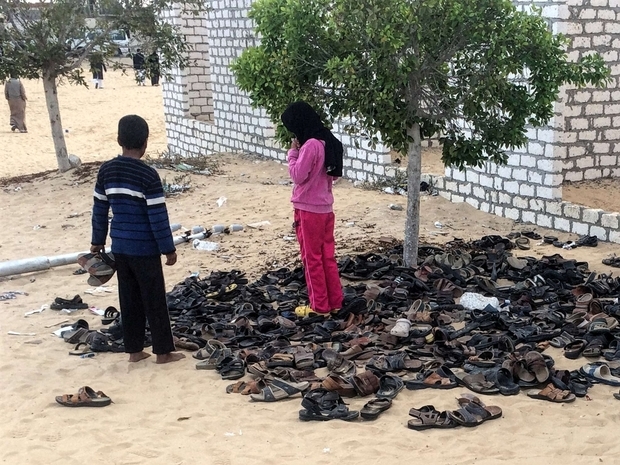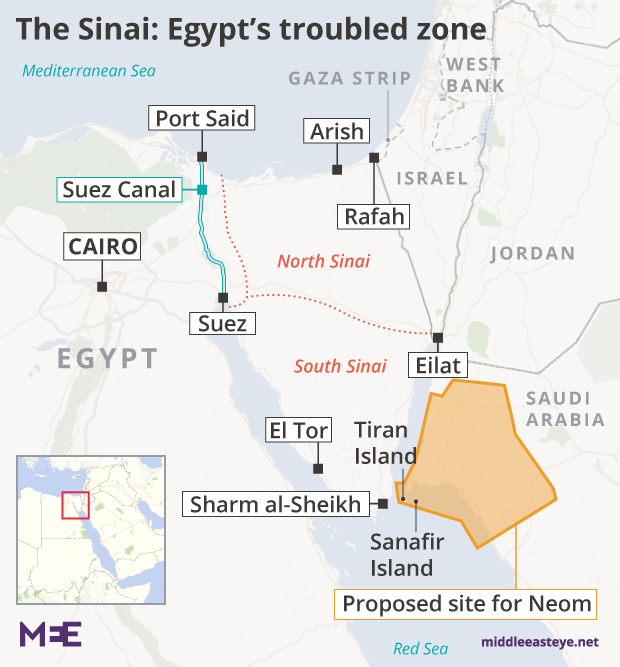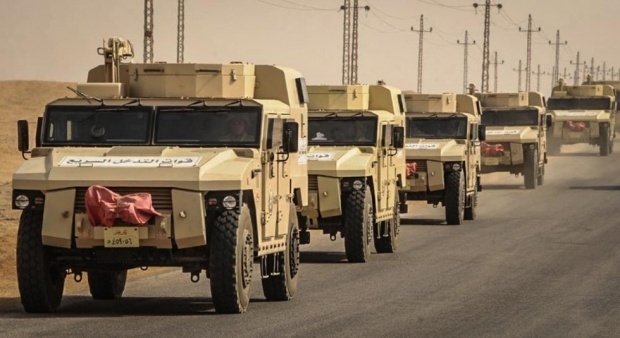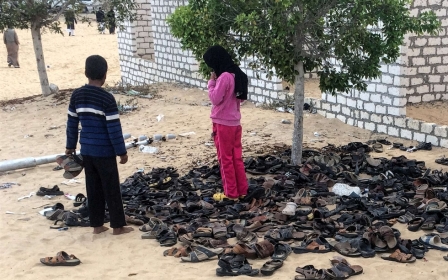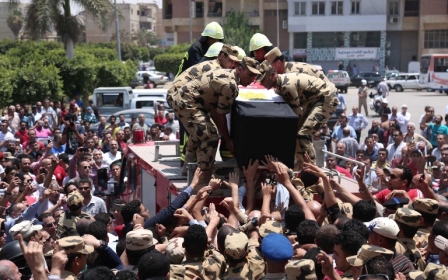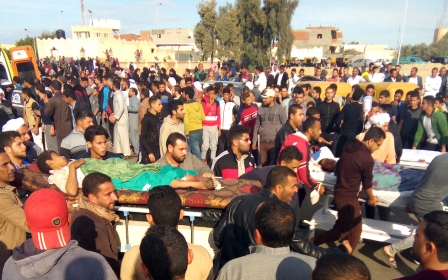ANALYSIS: Egypt mosque attack backfires as Sinai tribes call for mobilisation
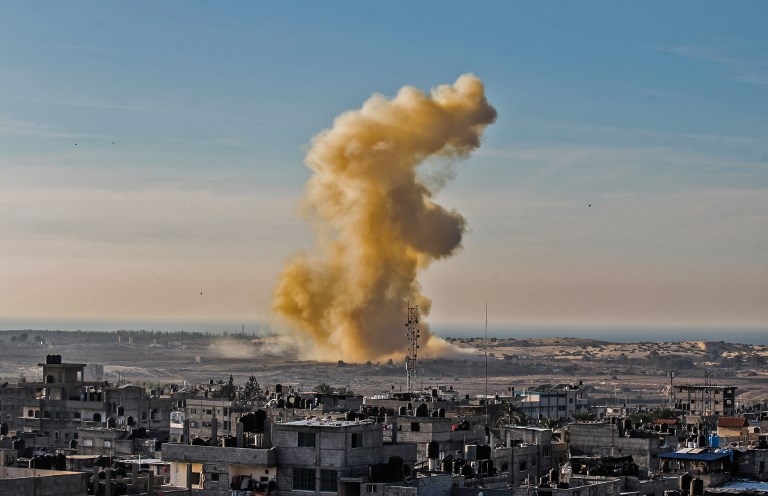
The massacre of 309 people at a packed North Sinai mosque on Friday has pointed to Egypt’s failing security policies in the face of a widening militant insurgency, although its very brutality could open the way for tribal forces to take a leading role in defeating Islamic State in Sinai, analysts say.
In the deadliest terrorist attack in Egypt’s modern history, between 25 and 30 gunmen surrounded the Rawda mosque of Bir al-Abed, a small town that lies 40 kilometres outside of Arish. After an explosion, gunmen targeted worshippers with gunfire, while setting seven parked cars ablaze to prevent victims from escaping. At least 27 children were killed.
Although no group has claimed responsibility for the attack, experts believe the incident bears the hallmarks of the Islamic State group’s affiliate Sinai Province, which claimed responsibility for downing a Russian passenger jet in 2015 and has regularly attacked Egyptian security forces.
Sinai’s tribes
With the Rawda mosque being a hub for the Sawarka tribe, one of the largest of the 11 main tribes in Sinai, the developments have raised the spectre of a tribal awakening to rid the region of militants.
Shortly after the attack, Ibrahim al-Argani, a sheikh of the Tarabin tribe, one of the largest in the Sinai, issued a statement calling for the mobilisation of all tribesmen in a counter-attack coordinated with the military.
It [the attack] clearly was planned to hit a target that resembles a strong tribal and ideological rival to IS and takfiri currents in North Sinai
- Mohannad Sabry, Sinai researcher
“We call on all men in Sinai’s tribes to join us in a coordinated retaliation with the military to put an end to this terrorism once and for all,” Argani wrote in a statement.
“We will not rest until we have completely sanitised our lands from every last takfiri. We will kill you and will not show you any mercy,” said Argani.
Militant messaging
Up until this incident, the Sinai Province primarily targeted Coptic Christians and security personnel, while generally avoiding the indiscriminate slaughter of Sunni Muslims. But with the targeting of Rawda mosque, the group directed its messages at both the Sufi communities and wider tribal populations of Sinai, which have predominantly avoided siding with either the state or the militant groups operating in the desert peninsula.
Targeting the Sawarka’s Jararat clan at the Rawda mosque was a deliberate act, say analysts, since the tribe has a strong Sufi following and is known for its public animosity toward the Islamic State.
“It [the attack] clearly was planned to hit a target that resembles a strong tribal and ideological rival to IS and takfiri currents in North Sinai,” said Mohannad Sabry, a Sinai researcher and author of Sinai: Egypt's Linchpin, Gaza's Lifeline, Israel's Nightmare.
Through the attack, the militants are also conveying to the wider Bedouin population of Sinai that helping the Egyptian government is a bad idea.
“There are members of the Sawarka tribe who were actively assisting the Egyptian state. This attack sends out a message that the state can’t protect them,” said Nasser Weddady, an analyst and independent consultant working on tribal affairs, radicalisation and terrorism.
Experts have also highlighted the ease with which the militants carried out the attack despite Egypt’s deployment to Sinai since 2013 of more troops than at any time since the country's 1973 war with Israel.
A window of opportunity?
While the attack highlights Sisi's failing security and counter-terrorism strategy, the incident has backfired on the perpetrators by further pushing Sinai's tribes into the hands of the state and creating an incentive for those who would not previously cooperate with the state to do so now.
According to Weddady, if the state were to take up previous proposals by the tribes to use local volunteers for reconnaissance with military units, it could have a chance at overcoming the growing militant threat in Sinai.
He says the state could also capitalise on an additional potential strength of the Sawarka and Tarabin tribes which lies in their transnational nature, with their clans extending beyond Egypt's borders and into Libya, Gaza and Jordan.
'There's nothing to suggest the Sisi regime has a long-term vision for dealing with the Sinai insurgency'
- Shadi Hamid, Brookings Institution senior fellow
“Now that Egypt has better relations with Hamas – which has members from the Sawarka tribe – the transnational nature of these tribes can prove a useful tool for the counter-terrorism fight as tribe members in Jordan and Gaza will be willing to help,” said Weddady.
But while analysts hope the Egyptian military and intelligence services will do away with their doctrine of conventional warfare, scorched-earth tactics and a lack of development in Sinai, they fear this is unlikely.
Instead, most observers remain despondent about a turnaround in Sisi's Sinai polices and counter-terrorism strategy.
“There's nothing to suggest the Sisi regime has a long-term vision for dealing with the Sinai insurgency,” explained Shadi Hamid, senior fellow at the Brookings Institution.
Moments after the attack, Egyptian President Abdel Fattah al-Sisi vowed to “take revenge using brute force” as Egyptian warplanes swooped over Sinai, dropping bombs that pounded vehicles used in the assault, as Egypt’s prosecutor general, Nabil Sadek, described the grisly scene in forensic detail on Saturday.
On Wednesday, he ordered his military command to use all force necessary to secure the Sinai peninsula within the next three months.
While Sisi claimed that the very incident was a “natural reaction to the achievements of the Egyptian military in countering terrorism on behalf of the whole world,” analysts pointed twoards the repetition of failed state tactics in the face of a widening militant insurgency in Sinai.
“The entire string of events is a repetition of what we have seen before… a deadly attack claiming dozens of lives followed by a Sisi speech and a military statement claiming it killed terrorists and destroyed bunkers,” said Sabry.
“It is very telling how Sisi pledged ‘brute force’ as if it hasn’t been used across Sinai for four years and caused scores of civilian casualties, billions of dollars in economic destruction and the displacement of thousands of families without any definitive or lasting success in the fight against terrorism,” added Sabry.
Since the military removed former president Mohamed Morsi in July 2013, violence has significantly increased in North Sinai, an underdeveloped and long-marginalised governorate that borders Israel and Gaza.
Between July 2013 and August 2015, Egyptian authorities destroyed around half of the town of Rafah, on the border with the Gaza Strip, evicting thousands of families, and demolished at least 3,255 buildings.
At the same time, as Sisi welcomed a line of foreign leaders to Cairo, where he signed deals for billions of dollars in advanced military equipment, American military officials tried to persuade him to allocate his resources – including $1.3 billion in annual American aid - to techniques and equipment better suited to fighting the insurgency.
But American officials say that Sisi and his generals have preferred to buy heavy weapons for their bases around the Nile, reported the New York Times.
"The Egyptian military is simply rather bad at counter-terrorism and counterinsurgency operations and American officials will often complain about the unwillingness of the Egyptian military to revisit or adapt its methods," confirmed Hamid.
But Egypt continues to see Sinai through a military prism, taking an aggressive approach to an alienated local population.
The military has destructed whole villages while offering little to solve the region’s deep social and economic problems, including chronic unemployment, illiteracy and poor access to health care.
Multiple accounts of torture and extrajudicial executions by the military, as well as indiscriminate military tactics have often inflicted civilian casualties and sown widespread resentment.
Middle East Eye propose une couverture et une analyse indépendantes et incomparables du Moyen-Orient, de l’Afrique du Nord et d’autres régions du monde. Pour en savoir plus sur la reprise de ce contenu et les frais qui s’appliquent, veuillez remplir ce formulaire [en anglais]. Pour en savoir plus sur MEE, cliquez ici [en anglais].


